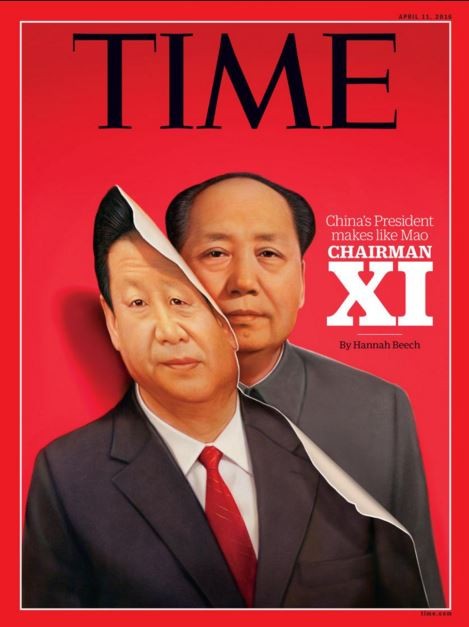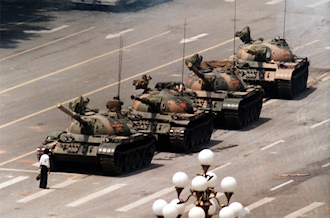From the 1989 Tiananmen Square Massacre to the Declaration of Power for Life
Written by Lee Suk Pei
Photograph from Wikipedia
Following the passage of the constitutional amendment that gave China’s President Xi Jinping the power to rule for life, one could not help but reminiscence on the protest that took place at Tiananmen Square, also known as “The Gate of Heavenly Peace,” 29 years ago and came so close to success in leading China to democracy. Yet, it can now only remain a tragic memory for many citizens dreaming of democracy in the one-party system of China.
Backdrop of the Incident
Hu Yaobang, then the general secretary of the Chinese Communist Party (CCP), was a liberal, pro-reformist leader who called for the reformation of the party by downgrading the central position of its Maoist ideology and replacing it with a more pragmatic policy that included being more transparent and opening up the economy. Hu urged citizens to reassess the Maoist dogma and decide for themselves the truth in a party publication. The bravery to question the authority of former General Secretary Mao Zedong did not stop there but went on to include vindicating falsely charged people during the Cultural Revolution and purging unapologetic Maoists and corrupt members of the CCP in order to replace them with young, educated ones. Due to the rather aggressive act of reformation, Hu was not very welcome within the party and, following several weeks of student demonstrations demanding more Western-style freedoms in 1987, he was forced to resign over his “mistake on major issues of political policy.”
What Sparked the Incident
Two years later, Hu’s death on April 15, 1989, saw thousands of students take to the streets to mourn his passing, which later turned into a pro-democracy protest that lasted for almost two months. The protest was also participated in by people from all walks of life, ranging from local teachers, laborers, farmers, and journalists to people even from other provinces. During the demonstrations, the CCP’s People’s Daily editorial declared the protests to be a conspiracy to overturn the government that needed to be curbed. Due to the inaction of the CCP toward the request for dialogue, the students decided to escalate the protest and so launched a hunger strike. However, this did not help much in getting the desired response and was instead met with a declaration of emergency by Premier Li Peng on the eighth day of the strike. In response, the students decided to create a symbol of the demonstration – a ten-meter-high statue resembling the Statue of Liberty called the Goddess of Democracy – which they erected in the center of Tiananmen Square. Seeing the reluctance of the students to leave the square, forceful measures were taken by sending in the army to curb the protest. On that very morning of June 4, tanks were running over protesters, bullets were being fired at the students, and military trucks were seen running over fleeing students. Despite the gruesome acts of the army, Wang Weilin, who was famously photographed standing in the way of an advancing tank column, demonstrated the fragile yet courageous spirit of the people fighting the regime. That powerful image sparked widespread outrage among Chinese around the world, many of whom were in solidarity with the students. The entertainment industry in Hong Kong even organized a concert to raise funds for the protestors.

The Aftermath
The official number of deaths from the massacre was withheld until recently. The officials downplayed the number of victims and even alleged that the massacre of June 4 did not take place. Recent leaks of documents estimated the number of deaths to be 10,000. The dispersal of the demonstration did not mean the end of the affair. Retaliatory actions were taken by the government to deal with protestors. Students and intellectuals who played a prominent role in the protest, including Wang Dan, Wu’er Kaixi, Chai Ling, and Liu Xiaobo, were listed as wanted persons. Some successfully escaped overseas while others were captured and later sought asylum in other countries. For those who decided to stay, some, including Nobel Peace Prize laureate Liu Xiaobo, who published the Charter 08 manifesto in 2008, were imprisoned until their deaths. Other participants who were not listed did not enjoy better treatment. Many of them have had to face hardships in life, especially when it comes to getting a job. Partners of the detainees were put under house arrest and their actions were under heavy surveillance. Mothers of the victims organized and formed the Tiananmen Mothers to demand the revelation of truth and the restoration of honors to their dead children. Students and intellectuals who successfully fled the country continued to voice their disapproval of the CCP and pressure the party to reveal the truth of the incident.
Overseas Chinese have not forgotten the tragedy. Many activists work relentlessly to remind people of the cruelty of the CCP, including the citizens of Hong Kong. Hong Kong’s pro-democracy activists have over the years organized annual candlelight vigils at Victoria Park. Thousands of people attend the events every year to mourn the death of the protestors and exert pressure on the Chinese government to reveal the truth, to admit their wrongdoings, and to end the one-party dictatorship. Activists in Malaysia have also shown their solidarity with the movement by organizing a 25th anniversary exhibition for June 4 and urging the world to never forget.
The then student leaders who have since been granted asylum in other countries, including Wang Dan, Wu’er Kaixi, Hou Dejian, and Zhou Fengsuo, can still be seen actively voicing their disapproval on social media. Artists and writers such as Ai Weiwei and Han Han actively direct their works toward ridiculing the Chinese government. And yet, keywords such as “June 4th” and “Tiananmen Square” are regarded as sensitive words and will return no results in Chinese search engines. Discussion of the incident and remembrance of the event in any form within mainland China are strongly prohibited. The highly censored and monitored Internet environment has resulted in a younger generation with next to no knowledge of the massacre. The venue of the demonstration, Tiananmen Square, is now heavily guarded to prevent the repetition of the 1989 protest.
The Ripple Effect
Though the protest failed to bring democracy to the communist nation, it has had a far-reaching effect on the rest of the world. Protesting the excessive interference of the state is a common activity in Hong Kong, as the annual July 1 pro-democracy marches, anti-national education protest, Occupy Central, and the Umbrella Movement show. Unsurprisingly, these protests have all ended with participating activists being imprisoned and with some even being the victims of forced disappearances. According to an article from Foreign Policy entitled “The Rift Began in Tiananmen Square,” the protest in Tiananmen Square triggered the rapid growth of pro-democracy movements in Eastern Europe, which eventually led to the collapse of communist regimes in that region. The premise is that the gruesome acts of the Chinese government in suppressing the protestors deterred other communist governments who were faced with pro-democracy movements from resorting to the same violent measures.
Future Outlook
The rhetoric stating that “a harmonious society is equivalent to one where everyone gets to eat” has been used by the CCP to limit the people’s liberty. The recent passage of the constitutional amendment that grants General Secretary Xi power for life has been likened to a return to the Maoist era by some, while others contend that the act paves the way toward a more efficient and coherent government under the same ruler. Nevertheless, both camps agree that China will never adopt a Western-style democratic constitution – at least not in our lifetime – and that General Secretary Xi’s administration will instead require “checks and balances with Chinese characteristics.” It is hoped that General Secretary Xi will become a good leader and make solid advances for China as a tribute to those who sacrificed their lives under tank tracks for a better China 29 years ago.
The Author
Suk Pei is from Malaysia and is currently doing her master’s degree in NGO studies at Chonnam National University. Though money is a concern for her, she thinks that freedom and liberty are more precious and priceless.




